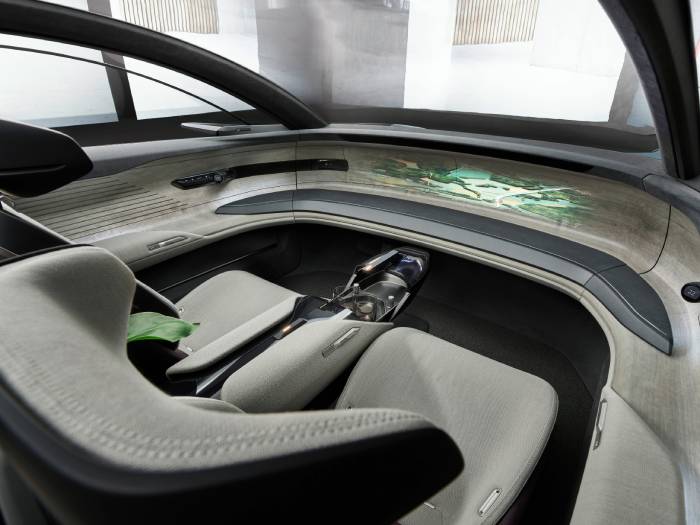The future of autonomous driving: ethics, safety and technology
The 2021 "SocAIty" study from the &Audi Initiative examines the ethical, legal and political issues concerning autonomous driving, outlining the mobility scenario of the future with experts in the field.
The next big radical change in the automotive industry after the transition to electric mobility will be autonomous driving. “For us, it is a key technology that can make traffic safer and mobility more comfortable and inclusive” explains Markus Duesmann, CEO of Audi AG. The Ingolstadt-based company, with the support of software specialists from CARIAD, the Volkswagen Group’s software company, intends to introduce autonomous driving in the second half of the decade.
But for autonomous vehicles to be broadly accepted, there are two aspects to consider, namely technological maturity and the social dimension: the legal and political conditions, together with people's attitudes, will be crucial for an innovative technology like autonomous driving to catch on.
The future of autonomous driving

&Audi Initiative published the study 'SocAIty' in which 19 scientific, political and economic experts discussed central issues concerning the future of autonomous driving. The study addresses three focal points: liability, ethics and data protection, in the respective chapters “Law and progress”, “Relationship of trust between human and machine” and “Networked security”.
The result paints a picture of mobility in 2030 that is very different from the current scenario, but not a science fiction film: “Audi wants to establish appropriate expectations for the possibilities and limits of technology in society and to create trust”, explains Saskia Lexen, Project Manager for the &Audi Initiative at Audi AG.
Autonomous driving in China and the US
One of the central insights of the study is that the mobility landscape in 2030 will be more diverse and compartmentalised, with more user-specific solutions, including forms of micromobility that will increase, particularly in cities.
The location of the individual user will be increasingly important and large cities, such as New York, London and Shanghai, will have comparable basic conditions and needs in terms of customer demands and expectations. According to most experts, the US will be the driving force behind autonomous driving: although not all new technologies will be developed in the US, its capital and expertise will be crucial to the incubation process. But even in China, new technologies are often quickly implemented.
Europe and self-driving vehicles

According to experts, China is a trailblazer in scaling and widespread technology penetration, also thanks to the rapid expansion of infrastructure and a high degree of social appreciation for innovation.
Germany and Europe, on the other hand, will mainly be innovation sites for vehicle technologies and high volume production: here the market will develop within ten years. This is why European consumer rights and data protection regulations will impact global conditions and product standards for the entire industry.
Mixed traffic: autonomous and with driver
Mobility in 2030 will be characterised by unprecedented, mixed traffic, with autonomous vehicles and vehicles driven by people. Road users will gradually adapt and have to learn new rules, but it will take time to process the cultural change and establish trust with autonomous driving.
“Only the increase we expect to see in comfort, safety and availability will sufficiently justify acceptance and confidence in the new technology”, explains Hiltrud Werner, Member of the Volkswagen Group Board of Management responsible for Integrity and Legal Affairs.
The social impact of autonomous driving

Apart from the potential for reducing traffic congestion and making it more ecologically sustainable, data-driven networked mobility could also have a huge social impact, with new services that take into account the needs of an increasing number of users, with easier access to mobility. “It is also about better access to mobility. Because mobility is the key in getting access to jobs, medical care, to clean food and so forth” adds expert Huei Peng, Professor of Mechanical Engineering and Director of Mcity, University of Michigan.
Then there is the issue of risk management, as Christoph Lütge, Director of the Institute for Ethics in Artificial Intelligence at the Technical University of Munich, points out. Contending with dilemmas of dangerous situations and potential accidents is inevitable for understanding the ethical aspects of autonomous driving. However, this is often an emotive and ideologised discussion and therefore, according to the experts, it will be important to clearly define the ethical foundations, based on realistic situations, addressing the real challenges and questions facing companies and legislators.
&Audi Initiative
The &Audi Initiative was created in 2015 to stimulate interdisciplinary exchange on new technologies like artificial intelligence and autonomous driving. It is also intended to support positive acceptance of new technologies over the long term and to establish appropriate expectations regarding possibilities and limits in society.
“We can only strengthen people's confidence in technical innovations if we take a transparent approach”, explains Lexen.“On one hand, it seems that society is not ready for self-driving cars everywhere: debates are often based on fears, and at the same time expectations of technology in general are very high. On the other hand, technology itself is increasingly part of everyone's everyday life. Furthermore, the legal situation is changing and development is moving very fast”.
Reality and future

“It will be very important to come to terms with the current reality of society and users. This means not underestimating people's habits and self-perceptions. For many people, driving their own car still means freedom, flexibility and self-determination. That is why it is important that as many people as possible directly experience the advantages of autonomous driving, and during this process it will be important to clearly communicate both the added value of autonomous technology and its current limitations”, Lexen reflects. “As a premium mobility company, we consider it our duty to deploy new technology responsibly”.
Obstacles to be overcome
Autonomous driving still faces a number of challenges involving technology, infrastructure and practicality. “Currently key technologies such as edge computing still aren't sufficiently mature. This means that artificial intelligence (AI) is still unable to interpret humans’ sometimes irrational or aggressive driving and respond to it correctly. On top of that, most regions of the world currently do not have a mobile network infrastructure like 5G to fully support autonomous driving”, Lexen concludes.
Source: AUDI AG
VGI | Responsible OU: VP | Creation date: article date | Class 9.1
